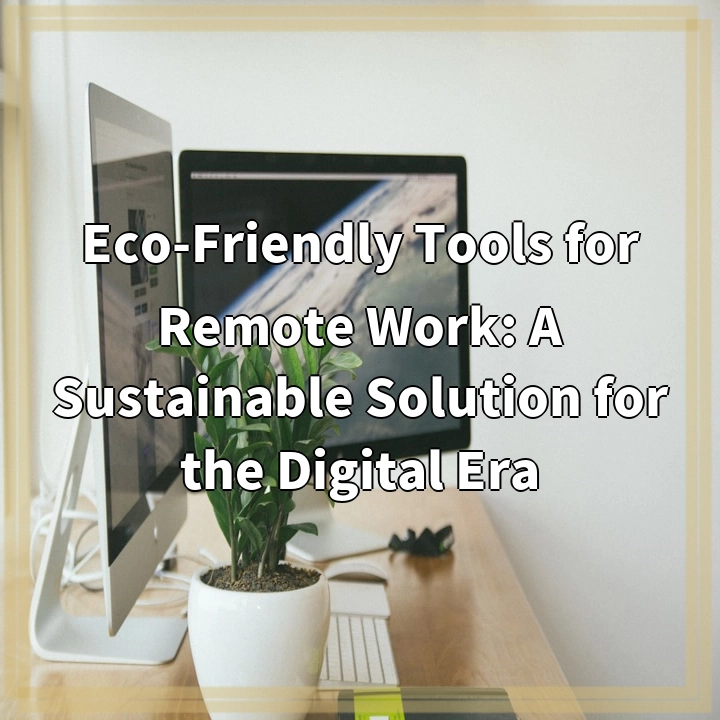Physical Address
304 North Cardinal St.
Dorchester Center, MA 02124
Physical Address
304 North Cardinal St.
Dorchester Center, MA 02124

The advent of remote work has revolutionized the way people work, providing flexibility, convenience, and cost savings. With advancements in technology, workers can now collaborate and complete tasks from the comfort of their homes or any location of their choice. However, this shift towards a digital workforce has not been without its environmental impact.
While remote work offers numerous benefits, there are significant environmental challenges associated with it. Here are some real-world problems to consider:
Remote work has led to increased energy consumption, which is a concern for sustainability.
Remote work has resulted in a surge in the demand for electronic devices, leading to the generation of electronic waste (e-waste). Improper disposal of e-waste can release hazardous materials into the environment, posing risks to ecosystems and human health.
Although remote work eliminates the need for daily commuting, it does not completely eliminate carbon emissions. Remote workers still rely on energy-consuming technologies and may need to travel occasionally for meetings or conferences. Additionally, the increased use of data centers to support remote work operations can result in substantial carbon emissions if not powered by renewable energy sources.
Remote workers may overlook sustainable practices that are typically implemented in traditional office spaces. Energy-saving measures, waste reduction techniques, and recycling programs may not be prioritized in remote work settings, exacerbating the environmental impact.
Remote work amplifies the existing digital divide, as not everyone has access to high-speed internet and necessary technologies. This lack of access exacerbates social and economic inequalities and limits the potential benefits of remote work.
Addressing these real-world problems is crucial to ensure that remote work becomes a truly sustainable solution for the digital era. In the next sections of this blog series, we will explore eco-friendly tools and practices that can help mitigate these environmental challenges. Stay tuned!
Solutions for Remote Work Sustainability:
To address the environmental challenges associated with remote work, several solutions can be implemented. These strategies aim to minimize energy consumption, reduce e-waste, decrease carbon emissions, promote sustainable practices, and bridge the digital divide. Here are some key solutions to consider:
Encourage the use of energy-efficient laptops, computers, and peripherals to reduce energy consumption in remote work setups. Look for devices with ENERGY STAR certification or low-power modes that automatically minimize energy usage when not in active use.
Promote responsible disposal and recycling of electronic devices. Encourage remote workers and organizations to properly recycle or donate old and unwanted electronics to minimize e-waste. Partner with reputable e-waste recycling facilities to ensure environmentally sound handling of discarded equipment.
Support remote work operations with renewable energy sources. This can include utilizing solar power, wind energy, or subscribing to green energy providers to offset carbon emissions associated with remote work.
Create and communicate sustainability guidelines for remote workers. This can include promoting energy-saving practices, waste reduction and recycling programs, encouraging the use of digital documents instead of printing, and providing guidance on eco-friendly behavior during remote work.
Address the digital divide by advocating for increased accessibility to high-speed internet and necessary technologies in underserved areas. Promote initiatives that provide digital literacy training and support to bridge the gap and ensure equal opportunities for remote work.
Utilize collaboration tools and platforms that prioritize energy efficiency. Choose tools that optimize internet bandwidth and minimize power consumption without compromising productivity and effective remote teamwork.
Promote sustainable commuting practices for occasions when remote workers need to travel. Encourage the use of public transportation, carpooling, or even offsetting carbon emissions through carbon offset programs for necessary travel.
By implementing these solutions, remote work can become a sustainable solution for the digital era. It is crucial for organizations and individuals to take collective action to minimize the environmental impact and maximize the benefits of remote work.
Eco-Friendly Tools for Remote Work
If you’re wondering where the article came from!
#